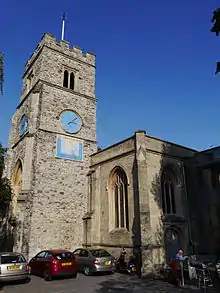Inclusive Church
Inclusive Church is an organisation founded in 2003 that advocates for the full inclusion of all people regardless of ethnicity, gender and sexual orientation, in the Christian churches (especially the Church of England), including in the threefold order of bishops, priests and deacons.[1] More broadly, it seeks "to raise awareness about the ways that people feel excluded by the church".[2]

Founding and organisation
Inclusive Church was founded in 2003, following the resignation of Jeffrey John, a celibate gay priest, as Bishop-designate of Reading, following controversy over his homosexuality. Its first chair was Giles Fraser, then vicar of St Mary's, Putney and later Canon Chancellor of St Paul's Cathedral.[3] The organisation's petition against John's resignation achieved nearly 10,000 signatures.[2]
In the decade after its creation, Inclusive Church's focus broadened away from sexual orientation. The organisation seeks to include all who feel excluded from churches.[2] In 2014–2015, the organisation published a series of books under the title Inclusive Church Resource, dealing with disability, mental health, sexuality, poverty, ethnicity, and gender.[4][5]
Inclusive Church's national co-ordinator is Ruth Wilde.[6] Its board includes elected independent trustees alongside representatives from other organisations with similar aims, such as Changing Attitude, the Association of Black Clergy, Women and the Church, and Modern Church.[7] Most member churches are part of the Church of England, but there are also member churches from the Methodist Church, the United Reformed Church, independent churches and churches outside the UK.[8]
Lectures
In 2013, Inclusive Church started hosting an annual lecture related to the organisation's goals. The inaugural lecture was given by Martyn Percy, then principal of Ripon College, Cuddesdon, and later Dean of Christ Church, Oxford, and was entitled "Beyond Inclusion: Whose Church Is It Anyway?"[9][10]
In 2014, the lecture was given by Linda Woodhead, Professor of Sociology of Religion at Lancaster University, and was entitled "Whatever happened to Liberal Christianity?"[9]
2015 General Synod campaign
In January 2015, Inclusive Church, in partnership with other organisations, began a campaign focused on the General Synod of the Church of England elections taking place later that year. The campaign aimed to "work against discrimination" in the Church of England during the five-year synod term.[11] It was described by the campaign co-ordinator as "an attempt to increase the number of people on General Synod, both lay and clergy, who would take an inclusive line against discrimination on areas of gender, race and sexual orientation".[12]
References
- "THE INCLUSIVE CHURCH NETWORK". Open Charities. Retrieved 4 February 2015.
- "About Inclusive Church". Inclusive Church. Archived from the original on 5 February 2015. Retrieved 4 February 2015.
- Vernon, Mark (February 10, 2004). "Archbishop hears regular church-goers call for an inclusive church". episcopalchurch.org. The Episcopal Church. Retrieved 4 February 2015.
- "Resource Book Series". Inclusive Church. Archived from the original on 5 February 2015. Retrieved 4 February 2015.
- "New inclusive church resources from DLT". Independent Catholic News. Retrieved 5 February 2015.
- "National Coordinator". Inclusive Church. Retrieved 30 December 2018.
- "Governance". Inclusive Church. Archived from the original on 5 February 2015. Retrieved 4 February 2015.
- "Joining IC". Inclusive Church. Archived from the original on 5 February 2015. Retrieved 4 February 2015.
- "The Inclusive Church Lecture". Inclusive Church. Archived from the original on 5 February 2015. Retrieved 4 February 2015.
- "Calendar – Worship". Southwark Cathedral. Retrieved 4 February 2015.
- "Synod 15". Inclusive Church. Archived from the original on 5 February 2015. Retrieved 4 February 2015.
- Davies, Madeleine (30 Jan 2015). "Campaigning groups limber up for autumn General Synod elections". Church Times. Retrieved 4 February 2015.